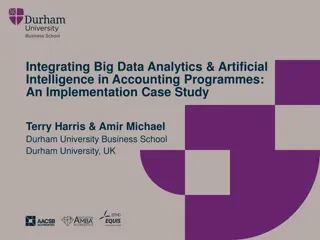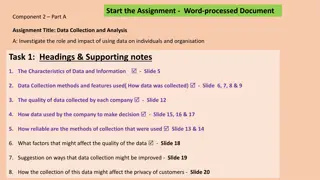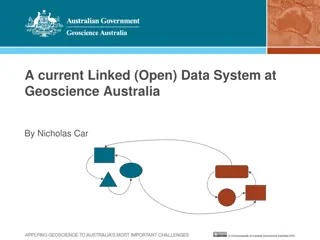
Leveraging Big Data for Cargo Market Intelligence
In the rapidly evolving landscape of global logistics, leveraging big data for cargo market intelligence has become indispensable for staying ahead of the competition. For businesses involved in cargo strategy consulting, such as Revenue Technology Services, the ability to harness and analyze vast amounts of data offers unparalleled opportunities to optimize operations, enhance decision-making, and drive growth.n
- cargo cloud solutions
- cargo pricing
- cargo revenue
- cargo revenue management
- cargo solutions
- cargo strategy consulting
Download Presentation

Please find below an Image/Link to download the presentation.
The content on the website is provided AS IS for your information and personal use only. It may not be sold, licensed, or shared on other websites without obtaining consent from the author. Download presentation by click this link. If you encounter any issues during the download, it is possible that the publisher has removed the file from their server.
E N D
Presentation Transcript
In the rapidly evolving landscape of global logistics, leveraging big data for cargo market intelligence has become indispensable for staying ahead of the competition. For businesses involved in cargo strategy consulting, such as Revenue Technology Services, the ability to harness and analyze vast amounts of data offers unparalleled opportunities to optimize operations, enhance decision-making, and drive growth.
The Power of Big Data in Cargo Market Intelligence Big data refers to the immense volumes of structured and unstructured data generated from various sources, including IoT devices, social media, transaction records, and more. In the context of cargo market intelligence, big data encompasses information related to shipping routes, fuel prices, weather patterns, customer demand, and other critical factors affecting the logistics sector. The primary advantage of utilizing big data in cargo strategy consultingis the ability to gain deep insights into market trends and operational efficiencies. By analyzing historical and real-time data, companies can identify patterns, forecast demand, and make informed decisions that align with market dynamics. Enhancing Operational Efficiency One of the most significant benefits of big data analytics is its potential to enhance operational efficiency. For cargo operators, this means optimizing routes, reducing fuel consumption, and minimizing delays. Big data can provide real-time insights into traffic conditions, port congestion, and weather forecasts, enabling companies to adjust their logistics strategies proactively. For instance, by integrating big data analytics into their operations, companies can predict peak demand periods and allocate resources accordingly. This not only improves service levels but also reduces operational costs, leading to a more sustainable and profitable business model.
Improving Customer Experience In the competitive world of cargo logistics, customer satisfaction is paramount. Leveraging big data allows companies to offer personalized services and improve the overall customer experience. By analyzing customer preferences and shipping histories, businesses can tailor their offerings to meet specific needs and expectations. Moreover, real-time tracking and transparency, made possible through big data, enhance customer trust and satisfaction. Clients can monitor their shipments in real-time, receive updates on potential delays, and access accurate delivery times, all of which contribute to a more reliable and trustworthy service. Strategic Decision-Making Big data is a powerful tool for strategic decision-making in cargo strategy consulting. It enables companies to conduct comprehensive market analysis, identify growth opportunities, and assess risks accurately. For example, data on emerging markets, competitor performance, and economic indicators can inform strategic decisions on market entry or expansion. Furthermore, predictive analytics, a subset of big data, allows companies to anticipate future trends and make proactive decisions. This forward-looking approach is crucial in an industry where market conditions can change rapidly, and the ability to adapt quickly is a significant competitive advantage.
Conclusion In conclusion, leveraging big data for cargo market intelligence is transforming the logistics industry. For companies engaged in cargo strategy consulting, like Revenue Technology Services, the ability to analyze and interpret vast amounts of data is critical for optimizing operations, improving customer experience, and making strategic decisions. By embracing big data analytics, businesses can stay ahead of the curve, drive innovation, and achieve sustainable growth in the ever-changing global cargo market.
















































